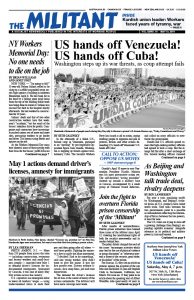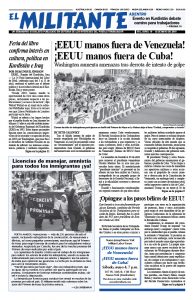REDMOND, Wash. — “We are not an ethnic minority but an independent people with a long history. The Chinese government is attempting to wipe this out,” Duke University student Aydin Anwar told a speakout at the Muslim Association of Puget Sound here April 19.
Close to 100 people attended the event, which was called to oppose the oppression of the Uighur people by Chinese authorities. Uighurs are a Turkic-speaking, largely Muslim people who live in a region they call East Turkistan. Chinese authorities refer to the area as Xinjiang, a huge expanse of northwest China bordering Central Asia.
“We are calling for an end to the concentration camps,” said Anwar, and for “the right to practice our religion, wear traditional clothing and to speak our languages.”
She described how the Chinese government attempts to erase any national or cultural identity for the Uighurs. They can be jailed for using East Turkistan as the name of their homeland or displaying the region’s traditional flag. To bolster their domination of East Turkistan the Chinese government fostered the immigration of Han Chinese into the region. Today they comprise 40% of the population there.
Anwar described how the Chinese government has organized the indefinite detention of over a million Uighars in “vocational centers” — in reality concentration camps. Uighurs are forced to undergo indoctrination sessions, sing hymns praising the Chinese Communist Party and write essays of self-criticism. Learning Mandarin is mandatory. They’re forbidden to fast during Ramadan. Solitary confinement, beatings and torture are used to try to break those who buck the authoritarian rules.
Fight for independence
Anwar described how the Uighur people established an East Turkistan Republic in 1944, as Japanese colonial rule in China was overturned. This republic was then overthrown after the 1949 Chinese Revolution by the newly established Chinese government led by Mao Zedong.
In the discussion period, other Uighurs explained how they are prevented from communicating with relatives in China and fear what will be done to their family members there if they speak out here against the Chinese government’s repression.
Anwar described how Beijing has stepped up surveillance of Uighurs, placing cameras everywhere across Xinjiang. In some cases Uighur families are forced to have Chinese minders live with them.
She also reported that leading Uighur public figures and supporters of independence have recently been “disappeared” for opposing Beijing’s repressive measures. These include the former president of the University of Xinjiang, sentenced to death for “separatist tendencies,” and Ilham Tohti, a writer and professor who was sentenced to life in prison.
Supporters of the Chinese rulers have attempted to silence those who speak out in the U.S. in support of their national rights. When Uighurs and their supporters organized a protest at Duke University, counterprotesters tried to break up their action, claiming participants were “Islamic extremists.”
Xinjiang is important to the Chinese capitalists as well as to the state. It has rich deposits of oil, coal and natural gas. And it is located alongside the path of the Chinese rulers’ Belt and Road Initiative, a series of vast infrastructure projects aimed at advancing Chinese capitalists’ fight for markets and expanding their sway across Asia and elsewhere.
Because of this, “the Muslim-majority countries, every one of them has remained silent,” about the conditions Uighurs face, Anwar said. “They all have deals with China.”
“My family members are Uighur-American activists and we’ve made the decision to speak out because it is silence on the issue that is killing Uighurs,” Anwar told Militant reporters at the Redmond event. “There is no turning back.”
Mary Martin contributed to this article.

